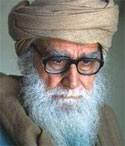
By Maulana Wahiduddin Khan, New Age Islam
20 February 2017
Donald Trump was elected the 45th President of the United States on November 8, 2016. During the election campaign as well as after entering the White House, he issued certain harsh statements about Muslim immigrants residing in America. This triggered criticism against Mr. Trump, not only by American Muslims but also from Muslims all over the world. According to Muslims, this development was clearly anti-Muslim and perhaps no Muslim has given a positive response in the matter.
Muslims believe that the Prophet of Islam is a complete model for them. This complete model, however, is not in terms of superiority of the Prophet, but rather in terms of his offering a guiding example in every matter. Whenever Muslims face a situation, it is their responsibility to search for a corresponding example from the life of the Prophet and then act upon it. If the Prophet is a complete model, then his life must provide a model for Muslims in every circumstance they face. There is indeed a model present in Prophet’s life with regard to the current situation as well.
The Prophet of Islam was born in Makkah, where he initiated his mission in 610 AD. After a period of thirteen years, he and his Muslim followers left Makkah for another town called Madinah. In this way, the Prophet and the Companions of the Prophet settled in Madinah as immigrant Muslims. Here they often had to face certain unpleasant situations from some residents of Madinah. For example, a tribal leader of Madinah, Abdullah ibn Ubayy, became a staunch opponent of the Prophet. Although he had pledged allegiance to the Prophet, Ibn Ubayy abhorred to see that immigrants from outside had taken a prominent place in his city.
Ibn Ubayy would often pass humiliating remarks at the Prophet and the Muslims who had come from Makkah. For example, once he made a statement which has been recorded in the Quran in these words: “Indeed, when we return to Madinah, [we] the ones most worthy of honour, will surely drive out from there the contemptible ones!” (63:8). The Quran or the Prophet showed no reaction at these demeaning words. On the contrary when Ibn Ubayy said this, the Quran simply stated: “All honour belongs to God, and to His Messenger and those who believe [in God]: but of this the hypocrites are not aware.” (63:8)
After migration, the Prophet lived in Madinah for ten years. Time and again he would face disparagement from those who had turned hostile to him. For instance, Ibn Ubayy once said to his Madinan followers about the Prophet and the Companions who had come from Makkah: Sammin kalba kayaquluka. It means, “Our example and the example of these Muslims from Makkah is as the saying goes, ‘Feed your dog and it will eat you up!’” (Seerah Ibn Ishaq).In spite of such provocations from Ibn Ubayy, the Prophet did not engage in retaliatory measures nor did he respond verbally to the hurtful talk from Ibn Ubayy and his supporters.
The approach followed by the Prophet and his Companions in this regard can be summed in these words: ‘Take it easy’. Neither did the Prophet take any practical steps nor did he react in words.
What was the reason for this unilateral avoidance on the part of the Prophet? The wisdom behind it was that the Prophet had a positive mission to work towards. Had he reacted to provocation from his opponents, it would have inevitably led to a chain reaction. By not reacting, the Prophet put an end to the provocation in the very first instance. In this manner, he found an opportunity to focus on a higher mission without wasting his time and energy on other issues.
The above policy of the Prophet can be summarized thus: ‘Avoid provocation and continue with your mission in a positive manner.’ This method of the Prophet proved to be successful and the result was that his mission spread peacefully all over Arabia.
The strange response by present-day Muslims is because they have made their Prophet only a matter of pride for their community. Due to this, they have ceased to take him as a role model. It is only by correcting this tendency of ours will we be able to lead an honourable life in this world.




 Moderate Islamist here
Moderate Islamist here


0 comments:
Post a Comment